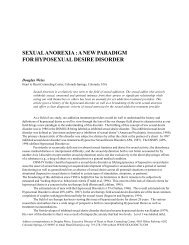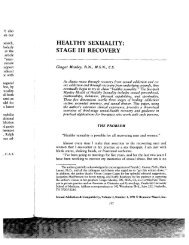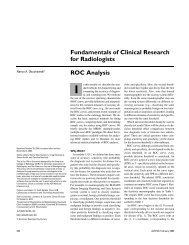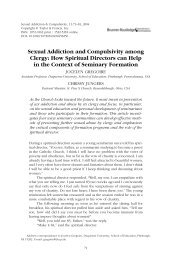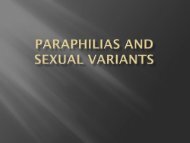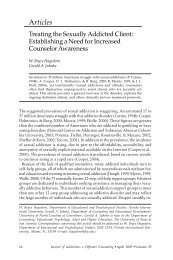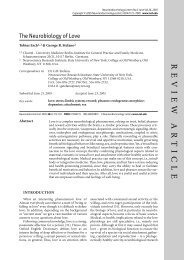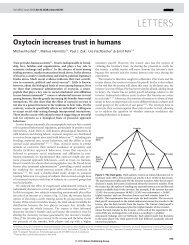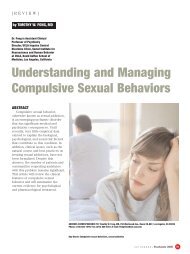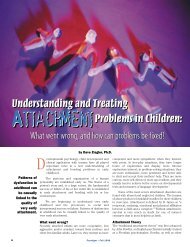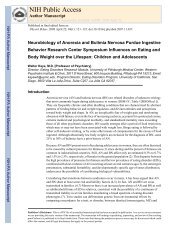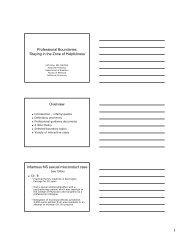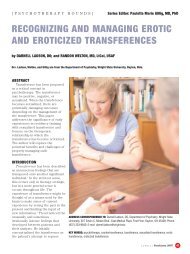Coverage and Liability Issues in Sexual Misconduct Claims
Coverage and Liability Issues in Sexual Misconduct Claims
Coverage and Liability Issues in Sexual Misconduct Claims
- No tags were found...
Create successful ePaper yourself
Turn your PDF publications into a flip-book with our unique Google optimized e-Paper software.
NORTH CAROLINA<strong>Coverage</strong> Trigger & Number ofOccurrencesIntentional Acts ExclusionsPerpetrator:Non-perpetrator:<strong>Sexual</strong> <strong>Misconduct</strong> ExclusionsStatute of LimitationsNot addressed <strong>in</strong> sexual misconduct sett<strong>in</strong>g.Courts have upheld policy exclusions for expected or <strong>in</strong>tended bodily<strong>in</strong>jury to claims aga<strong>in</strong>st perpetrators of childhood sexual abusebased on the “<strong>in</strong>ferred <strong>in</strong>tent” doctr<strong>in</strong>e. Nationwide Mutual Ins. Co.v. Abernathy, 445 S.E.2d 618 (N.C. Ct. App. 1994); Allstate Ins. Co.v. Lahood, 2004 WL 2792037 (N.C. Ct. App. 2004). Intent to harmis also <strong>in</strong>ferred <strong>in</strong> acts of sexual harassment of adults. Russ v. GreatAmerican Ins. Cos., 464 S.E.2d 723 (N.C. Ct. App. 1995).Exclusions for <strong>in</strong>tentional conduct do not preclude coverage foran employer’s alleged negligent hir<strong>in</strong>g <strong>and</strong> supervision of anemployee-perpetrator because the employer’s liability is predicatedon negligence, not <strong>in</strong>tentional or crim<strong>in</strong>al acts. Durham Board ofEducation v. National Union Fire Ins. Co. of Pittsburgh, 426 S.E.2d 451(N.C. Ct. App. 1993).Court upheld sexual molestation exclusion <strong>in</strong> homeowner’s policy topreclude coverage to <strong>in</strong>sured music teacher who sexually molestedm<strong>in</strong>or student. Nationwide Mutual Ins. Co. v. Abernethy, 445 S.E.2d618 (N.C. Ct. App. 1994).<strong>Claims</strong> for assault, battery, <strong>in</strong>jury to the person or rights of anothermust be brought with<strong>in</strong> three years. 2001 N.C. Sess. Laws 175.There is a statutory discovery rule which provides that a personal<strong>in</strong>jury cause of action shall not accrue until bodily harm becomesapparent or reasonably should have been apparent; however, nocause of action shall accrue more than 10 years from the last act oromission which gives rise to the cause of action. N.C. Gen. Stat. § 1-52(16).Allegations of mental illness or post-traumatic stress disorder fromchildhood sexual abuse may present evidence of adult <strong>in</strong>competenceto toll the limitations period, but such allegations can be defeatedwith evidence from a mental health professional that the claimant’semotional distress could have been diagnosed with<strong>in</strong> three yearsof manifestation. Soderlund v. Kuch, 546 S.E.2d 632 (N.C. Ct.App. 2001); See also Leonard v. Engl<strong>and</strong>, 445 S.E.2d 50 (N.C. Ct.App. 1994), review denied, 455 S.E.2d 663 (N.C. 1995) (Claimant’salleged post traumatic stress disorder <strong>and</strong> repressed memory as aresult of gr<strong>and</strong>mother’s sexual abuse of her 28 years prior to fil<strong>in</strong>gsuit constituted evidence that claimant was rendered “<strong>in</strong>competent,”thereby toll<strong>in</strong>g the statute of limitations).Report<strong>in</strong>g LawsOtherN.C. Gen Stat. §7B-101 et. seq.In a case alleg<strong>in</strong>g negligent retention <strong>and</strong> supervision aga<strong>in</strong>st churchorganizations aris<strong>in</strong>g out of sexual misconduct by a church m<strong>in</strong>ister,the court found that the First Amendment prohibited <strong>in</strong>quiry <strong>in</strong>to thereligious organizations’ hire or discharge decisions but that courtsmay resolve claims of negligent retention <strong>and</strong> supervision s<strong>in</strong>ce theyneed only <strong>in</strong>quire <strong>in</strong>to whether the church knew or had reason to knowof a m<strong>in</strong>ister’s propensity to engage <strong>in</strong> sexual misconduct. Smith v.Privette, 495 S.E.2d 395 (N.C. Ct. App. 1998).– 48 –



